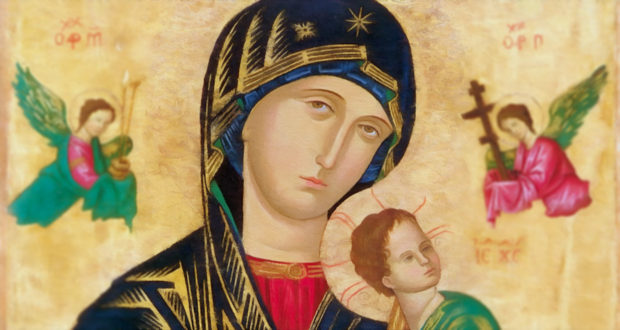Some of us have been in parishes where a copy of the miraculous picture of Our Lady of Perpetual Help hangs and where the parish members join in a weekly novena to the Blessed Mother under this title. Some of us, as we visit an unfamiliar church, find on a wall a copy of the miraculous picture, whose history is miraculous as well.
A Mother Always Accessible
On June 27th, the Church celebrates the feast of the Sacred Heart of Jesus, along with Our Lady of Perpetual Help, the day before the feast of the Immaculate Heart of Mary. Mary’s heart is so close to the heart of Jesus since she carried Him in her womb, and the Church teaches that Her Divine Son will not refuse her anything.
All of the miraculous pictures, statues, scapulars, and medals, along with the Rosary of Our Blessed Mother, provide us with an incredible abundance of opportunities to ask Jesus and Mary for blessings we need for ourselves and our families.
The Church teaches that Mary’s help is perpetual, available for us at any time and ongoing, literally without end, unceasing, and has been since the Annunciation. Considering all her apparitions and her messages to help us to attain Heaven, it is clear that Jesus Himself wishes us to consider her our Mother of Perpetual Help.
A Fascinating History
As with so many of the sacramentals, the story of the painting of Our Lady of Perpetual Help shows many twists and turns over a period of many, many years. A traveling merchant stole the picture from a church in Crete, the largest island of Greece, where it was known for numerous miracles. A year later, the merchant arrived in Rome with the picture, but immediately became very ill.
A Roman friend took care of him and when it was evident he was dying, the merchant told his Roman friend the story of his theft of the miraculous picture. It is likely that the Roman friend was the writer of this story, written on a piece of parchment which was attached to the back of the picture.
The dying and remorseful merchant asked his Roman friend to take the picture to a church where he believed it belonged. After the merchant died, the Roman took the picture to his home, but on the pleading of his wife, he did not take the picture to a church. The Roman friend later stated that the Blessed Mother appeared to him and asked him to take the picture to a church, but his wife continued to prevail.
The Blessed Mother appeared on two occasions to their six-year-old daughter, telling her to tell her mother of the Blessed Mother’s command to take the picture to St. Matthew the Apostle Church in Rome. The day of the second apparition, the astonished mother took the picture to the church, where it was properly enshrined in 1499 by the Augustinian Fathers.
Typically Eastern Rite
The picture is actually an Eastern Rite icon, Byzantine art more symbolic than realistic. The Infant Jesus and Mary are surrounded by the objects of His sufferings and crucifixion, painted on wood, likely in the fourteenth century. The painting measures only 17 by 20 inches; the colors are typical of Eastern Rite icons, with deep blue, red, and gold.
The many details in this small painting hold so much meaning, it is necessary to spend time studying the image. One thing is clear in the picture: the Mother of God knew beforehand the incredible details of her Son’s sufferings, and that the Baby Jesus looked with human apprehension at the instruments of His crucifixion.
St. Alphonsus Liguori wrote extensively about the Blessed Mother in his book The Glories of Mary. He wrote “…we may understand the confidence that the Holy Church has in Mary, we need only remember that in all public calamities, the Church invariably invites all to have recourse to the protection of the Divine Mother by novenas, prayers, processions, by visiting the churches dedicated in her honor and her images. She wishes us always to seek her and invoke her aid.”
In the current culture of anti-Christian values, against life, marriage, and family life—a public calamity if every there was one—we home schooling families need to obtain a copy of this picture, and daily say the Memorare.
Memorare
Remember, O most gracious Virgin Mary, that never was it known that anyone who fled to your protection, implored your help or sought your intercession, was left unaided. Inspired with this confidence, I fly to you, O Virgin of virgins, my Mother; to you do I come, before you I stand, sinful and sorrowful. O Mother of the Word Incarnate, despise not my petitions, but in your mercy hear and answer me. Amen.
Header Image CC LimosaCorel

 Seton Magazine Catholic Homeschool Articles, Advice & Resources
Seton Magazine Catholic Homeschool Articles, Advice & Resources

